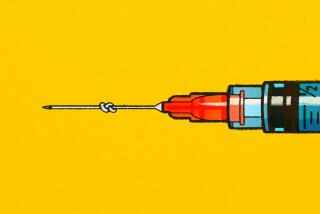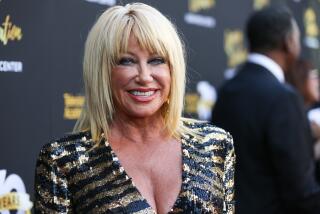Companies Debut 1st Ads for Saline Breast Implants
- Share via
Wearing a bikini takes courage enough. But it’s about to get tougher this summer as the nation’s two largest makers of breast implants launch the first ever ads directed at consumers.
McGhan Medical will have ads on beaches across the U.S. telling women that “now you can have the confidence you’ve always wanted.” Archrival Mentor Corp. will offer women who call a toll-free information line “bathing suit” coupons, with a description of its implants and lists of surgeons who use them.
The dueling ads come amid a resurgence in breast implant surgeries as consumers--and manufacturers--put the controversy about silicone gel implants behind them. McGhan’s parent, Santa Barbara-based Inamed Corp., in February paid $32 million to settle a lawsuit brought by thousands of women who said its silicone implants harmed their health.
Pitches from the implant makers take different approaches. McGhan appeals to women’s insecurities about their appearance, asking in one print ad that shows a woman in lacy lingerie, “Have you ever imagined feeling more voluptuous?”
Mentor said commercials scheduled to air in July will focus on implants as a lifestyle choice.
“It’s an issue of self-esteem,” said Trevor Pritchard, president of Mentor Medical, a division of Mentor, also based in Santa Barbara.
Since the early 1990s, when the FDA removed silicone gel breast implants from the market, saline implants have been the only option for women who wish to get breast implants for cosmetic reasons. Those seeking breast reconstruction procedures can request silicone gel implants.
Mentor and Inamed, which together account for nearly all saline implant sales, hope to boost demand for the surgeries, which have more than tripled since 1992. (However, for every two women who get breast implants, another woman opts for breast reduction surgery.)
Each company includes in its ads a toll-free number women can call to obtain kits with financing information and a list of doctors who perform the surgery.
McGhan’s $1-million campaign is notable in that the company worked closely with Conde Nast’s Glamour magazine to conduct research and develop advertising. Glamour surveyed its readers, inquiring about their attitudes about breast implants. The magazine also prepared a letter from McGhan that it will send to doctors citing the benefits of saline implants.
“One of the findings was women really did want to be further educated on plastic surgery,” said Mary Berner, vice president and publisher of Glamour.
McGhan’s magazine ads feature busty models and invite women to “make your dreams come true.” Women who pay $9.95 for an an information kit receive a video and a $50 gift certificate toward an implant operation, which typically costs between $4,000 and $7,000.
Besides placing ads in Glamour, McGhan’s deal with Conde Nast calls for plugs on Glamour-sponsored kiosks at bus stops and at beaches in Southern California, the Great Lakes region and the Jersey Shore. The kiosk ads for McGhan, which show a woman in a bikini top, don’t have disclaimers about side effects, which appear in McGhan’s magazine ads and are typically required by the government.
A McGhan representative said the company isn’t required to submit its ads to the Food & Drug Administration.
McGhan said its ads, which first appeared in the June issue of Glamour, are working. Its toll-free information line has received 4,300 calls in the 40 days since the campaign began. About 40% of the callers ordered the kit.
McGhan is also advertising in Cosmopolitan magazine.
Mentor kicks off its national campaign with ads in the July issues of Glamour, Cosmopolitan, Marie Claire, Self and Shape, among other magazines. The company also plans TV ads on network and cable channels.
The ads will show women in different settings talking about how they have researched breast implants and decided to get the surgery. The ads will include a toll-free number women can call for more information.
“It’s a growing market, and women are interested in more information about it,” Pritchard said.
McGhan says its implants are more realistic because of their so-called teardrop shape.
“Typically implants are round,” said David Barella, executive vice president of sales and marketing. “Imagine cutting a grapefruit in half and gluing it to your chest. It gives a very obvious and very artificial result.”
Despite publicity about actress Pamela Anderson and others removing implants, “women are convinced that breast implants are safe and they are coming back to get them,” said Paul Schnur, president of the American Society of Plastic & Reconstructive Surgeons and chief of surgery at the Mayo Clinic in Scottsdale, Ariz.
But critics of the campaigns say it’s disingenuous for a company to say it’s trying to educate women about saline breast implants when there is little clinical research on whether saline implants are safe.
“Manufacturers have not been the best source of accurate information about the risks of breast implants,” said Diana Zuckerman, vice chairwoman of the board of the National Women’s Health Network. “So any direct-to-consumer advertising is bound to encourage more women to get implants without giving them the information they need to make an informed choice.”
Saline implants, which hit the U.S. market in the late 1960s, have never been formally approved for sale. The devices were grandfathered in under a 1976 law that requires all medical devices to be submitted to the FDA for approval.
Under pressure from consumer groups, the FDA required breast implant makers to submit clinical studies to demonstrate the safety of saline implants. The agency, which mandated the studies in late 1994, expects to receive the results sometime this year.
Complications can result from breast augmentation, including scar tissue that can form around the implant and deflation or rupturing, according to the fine print on the back of McGhan’s ad in Glamour’s May issue.
According to the ad, which appears in the middle of a story about sex in Glamour’s May issue and Cosmopolitan’s June issue, implants can also make accurate mammograms--and detecting breast cancer--tougher, can affect feeling in the nipple and breast and can make breast-feeding difficult.
Responding to lobbying from surgeons and consumers who want the agency to return silicone gel implants to the market, the FDA has also asked manufacturers to provide studies regarding their safety.
“Silicone gives a more natural-feeling breast. The FDA may approve silicone implants again for augmentation,” Schnur said. “If they do, you will see a lot of them.”
(BEGIN TEXT OF INFOBOX / INFOGRAPHIC)
Cosmetic Change
Breast augmentation was the second-most popular cosmetic surgery procedure in the U.S. in 1998. The top five cosmetic surgery procedures in the U.S. in 1998 compared with the use of these procedures since 1992, in thousands of recipients:
Liposuction
1992: 47.2
1998: 172.1, up 265%
Breast augmentation
1992: 32.6
1998: 132.4, up 306%
Eyelid surgery
1992: 59.5
1998: 120.0, up 102%
Face lift
1992: 40.1
1998: 70.9, up 77%
Chemical peel
1992: 19.0
1998: 66.0, up 247%
Against the Trend
Several celebrities have chosen to have breast implants removed--and make that decision public. Some of the recent ones:
Pamela Anderson
Jenny McCarthy
Mary McDonough
Note: Breast augmentations dropped markedly in 1992 when the Food and Drug Administration took silicone gel breat implants off the U.S. market due to alleged health concerns.
Source: American Society of Plastic & Reconstructive Surgeons
More to Read
Inside the business of entertainment
The Wide Shot brings you news, analysis and insights on everything from streaming wars to production — and what it all means for the future.
You may occasionally receive promotional content from the Los Angeles Times.










